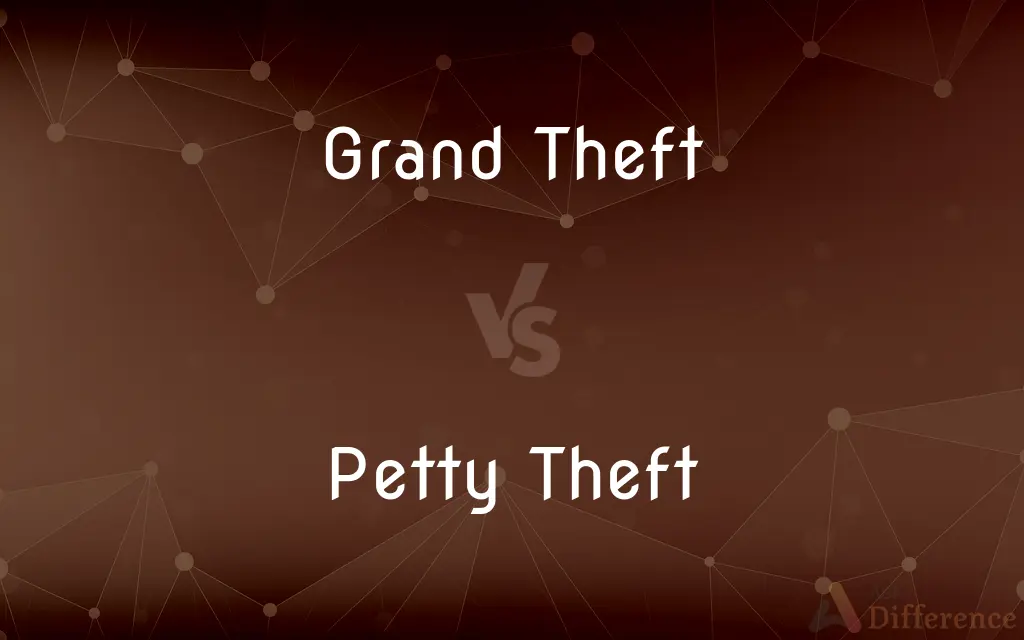Grand Theft vs. Petty Theft — What's the Difference?
By Maham Liaqat & Fiza Rafique — Published on February 28, 2024
Grand theft involves the unlawful taking of property of significant value, subject to harsher penalties, while petty theft pertains to the theft of items of lesser value, resulting in milder legal consequences.

Difference Between Grand Theft and Petty Theft
Table of Contents
ADVERTISEMENT
Key Differences
Grand theft and petty theft are legal terms used to differentiate the severity of theft crimes based on the value of the stolen property. The threshold value that separates grand theft from petty theft varies by jurisdiction but is a crucial factor in determining the charges and penalties a perpetrator may face.
Grand theft is characterized by the theft of property, money, or services above a certain value. This threshold is often set by state or local laws and can vary significantly. For example, stealing an item worth more than $950 might be considered grand theft in one jurisdiction, while in another, the threshold might be $1,000 or more. Grand theft can be charged as a misdemeanor or felony, depending on the circumstances of the crime and the jurisdiction, and can result in significant fines, restitution, and imprisonment.
Petty theft, also known as petit theft in some regions, involves the theft of property below the jurisdiction's threshold value for grand theft. It is generally considered a less serious crime than grand theft and is usually classified as a misdemeanor. Penalties for petty theft are typically less severe than for grand theft and may include smaller fines, community service, probation, or short jail terms.
The nature of the item stolen can also affect whether a theft is considered grand or petty. Some jurisdictions have specific laws that categorize the theft of certain items as grand theft regardless of their value, such as automobiles or firearms.
In addition to the value of the stolen property, other factors can influence the classification and penalties of theft crimes, including the perpetrator's criminal history, the use of force or fraud, and the presence of aggravating or mitigating circumstances.
ADVERTISEMENT
Comparison Chart
Value of Stolen Property
Above a set threshold, often varying by jurisdiction.
Below the jurisdiction's threshold for grand theft.
Legal Classification
Can be a misdemeanor or felony.
Generally classified as a misdemeanor.
Penalties
Heavier fines, longer probation, or imprisonment.
Lesser fines, community service, short jail term, or probation.
Examples
Stealing a car, expensive jewelry, or large sums of money.
Shoplifting low-cost items, minor cash theft.
Aggravating Factors
Use of force, theft of specific items like firearms.
Fewer aggravating factors compared to grand theft.
Compare with Definitions
Grand Theft
Can involve various property types.
Grand theft includes taking expensive electronics, jewelry, or large amounts of cash.
Petty Theft
Often involves everyday items.
Petty theft frequently involves common items like food, inexpensive clothing, or small electronics.
Grand Theft
Theft of high-value property.
Stealing a vehicle valued over $5,000 is considered grand theft.
Petty Theft
Involves items of lesser value.
Shoplifting clothing worth under $500 could be classified as petty theft.
Grand Theft
Felony charges possible.
Grand theft charges can escalate to a felony level, affecting future employment and rights.
Petty Theft
Less impact on criminal record.
A petty theft conviction may have a less severe impact on one's criminal record.
Grand Theft
Involves higher restitution.
Offenders may be required to pay substantial restitution to the victims in grand theft cases.
Petty Theft
Generally a misdemeanor.
Petty theft charges are often misdemeanors with minimal jail time.
Grand Theft
Subject to severe penalties.
Conviction for grand theft might result in several years of imprisonment.
Petty Theft
Smaller fines and penalties.
Penalties for petty theft might include a fine or community service.
Common Curiosities
Can someone be charged with both grand and petty theft?
It's possible to face multiple theft charges, including both grand and petty theft, if the crimes involved items of varying values or occurred under different circumstances.
How do courts determine the value of stolen property in theft cases?
Courts typically consider the market value or replacement cost of the property at the time of the theft to determine its value.
Are there different types of grand theft?
Yes, grand theft can be categorized by the type of property stolen, such as grand theft auto or grand theft firearm, each potentially carrying different penalties.
Is restitution always required in theft cases?
While often part of the sentence, restitution requirements can vary based on the case specifics, the defendant's ability to pay, and the jurisdiction's laws.
What is the value threshold for grand theft?
The value threshold for grand theft varies by jurisdiction but is typically set at a level that distinguishes significant thefts from minor ones.
Can petty theft ever be charged as a felony?
In rare cases and depending on the jurisdiction, repeated offenses or aggravating circumstances may elevate a petty theft charge to a felony.
What are the long-term impacts of a grand theft conviction?
A grand theft conviction, especially if charged as a felony, can have lasting impacts, including difficulty finding employment, loss of certain civil rights, and social stigma.
Can theft charges be dropped or reduced?
Yes, theft charges can sometimes be dropped or reduced through plea bargaining, especially if it's a first offense or there's insufficient evidence.
How does a theft conviction affect employment prospects?
A theft conviction, particularly for grand theft, can significantly hinder employment opportunities, especially in roles requiring trustworthiness or financial responsibility.
What defenses are available for someone charged with theft?
Possible defenses include claiming ownership of the property, lack of intent to steal, consent from the owner, or intoxication impacting the ability to form intent.
Share Your Discovery

Previous Comparison
Dates vs. Figs
Next Comparison
Google Maps vs. SygicAuthor Spotlight
Written by
Maham LiaqatCo-written by
Fiza RafiqueFiza Rafique is a skilled content writer at AskDifference.com, where she meticulously refines and enhances written pieces. Drawing from her vast editorial expertise, Fiza ensures clarity, accuracy, and precision in every article. Passionate about language, she continually seeks to elevate the quality of content for readers worldwide.
















































